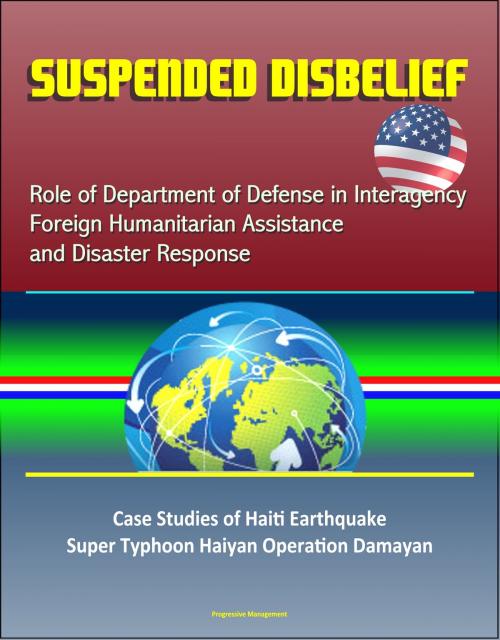Suspended Disbelief: Role of Department of Defense in Interagency Foreign Humanitarian Assistance and Disaster Response – Case Studies of Haiti Earthquake, Super Typhoon Haiyan Operation Damayan
Nonfiction, History, Military, United States, Social & Cultural Studies, Social Science| Author: | Progressive Management | ISBN: | 9781370263745 |
| Publisher: | Progressive Management | Publication: | February 26, 2017 |
| Imprint: | Smashwords Edition | Language: | English |
| Author: | Progressive Management |
| ISBN: | 9781370263745 |
| Publisher: | Progressive Management |
| Publication: | February 26, 2017 |
| Imprint: | Smashwords Edition |
| Language: | English |
This excellent report has been professionally converted for accurate flowing-text e-book format reproduction. What actions, if any, will make foreign humanitarian assistance and disaster response (FHA/DR) operations in the Department of Defense (DOD) more effective? The requirement for interagency responses to events of great magnitude has created the need for leaders of those participating organizations to grasp what is required of them during those instances. The DOD will achieve increased effectiveness in FHA/DR operations by educating strategic and operational leaders on their authorities during FHA/DR operations. This fundamental education will lead directly to the informed achievement of clearly articulated strategic objectives, in whole or in part, through the more effective arrangement of tactical actions in time, space, or purpose.
The ambiguous role of the military in a disaster response is nothing new. Congress early rationalized such measures as legitimate when it considered them to be in the national interest. Following a violent earthquake in Caracas, Venezuela in 1812, the US Congress ultimately passed legislation to deliver foreign aid. The earthquake in Venezuela that precipitated the United States' first foreign disaster assistance mission killed 10,000 people in Caracas alone. American newspapers carried accounts of bodies littering the debris and orphaned children wailing for lost parents. Prompted by these reports, Alexander Scott, an American diplomatic representative to Caracas who had not yet departed for his post, urged Congress to send food to the victims. The Venezuelans also requested assistance. Congress responded by appropriating $50,000 for relief supplies to be administered by Scott upon his arrival in the country. US vessels transported the relief commodities, flour in this instance, to the beneficiaries in the devastated area. Unfortunately, the donation arrived in May but Scott did not land until June. In the meantime, the royalists, then battling revolutionaries for control, seized many of the supplies and did not distribute them. They also impounded the vessels and crews that had brought the supplies and released both only after extended negotiations. However, despite all the problems, food reached some of the people and saved them from starvation.
This excellent report has been professionally converted for accurate flowing-text e-book format reproduction. What actions, if any, will make foreign humanitarian assistance and disaster response (FHA/DR) operations in the Department of Defense (DOD) more effective? The requirement for interagency responses to events of great magnitude has created the need for leaders of those participating organizations to grasp what is required of them during those instances. The DOD will achieve increased effectiveness in FHA/DR operations by educating strategic and operational leaders on their authorities during FHA/DR operations. This fundamental education will lead directly to the informed achievement of clearly articulated strategic objectives, in whole or in part, through the more effective arrangement of tactical actions in time, space, or purpose.
The ambiguous role of the military in a disaster response is nothing new. Congress early rationalized such measures as legitimate when it considered them to be in the national interest. Following a violent earthquake in Caracas, Venezuela in 1812, the US Congress ultimately passed legislation to deliver foreign aid. The earthquake in Venezuela that precipitated the United States' first foreign disaster assistance mission killed 10,000 people in Caracas alone. American newspapers carried accounts of bodies littering the debris and orphaned children wailing for lost parents. Prompted by these reports, Alexander Scott, an American diplomatic representative to Caracas who had not yet departed for his post, urged Congress to send food to the victims. The Venezuelans also requested assistance. Congress responded by appropriating $50,000 for relief supplies to be administered by Scott upon his arrival in the country. US vessels transported the relief commodities, flour in this instance, to the beneficiaries in the devastated area. Unfortunately, the donation arrived in May but Scott did not land until June. In the meantime, the royalists, then battling revolutionaries for control, seized many of the supplies and did not distribute them. They also impounded the vessels and crews that had brought the supplies and released both only after extended negotiations. However, despite all the problems, food reached some of the people and saved them from starvation.















